How to Make the Best Nigerian Akara
How to Make Akara: Nigerian Bean Fritters! Akara, or beans fritters, is a popular Nigerian savory (vegan) fitter made with beans, mainly black-eyed peas. akara, also known as beans cakes, beans balls, koosé, or acarajé, is a famous street food across Africa and beyond. Across most Nigerian cities, you find akara spots in the mornings and…
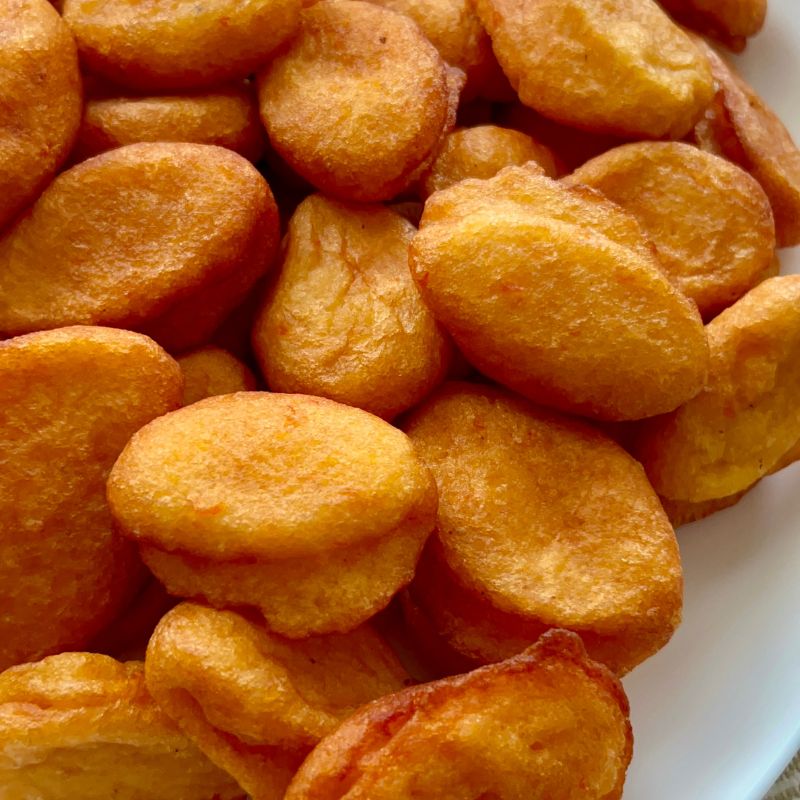
How to Make Akara: Nigerian Bean Fritters!
Akara, or beans fritters, is a popular Nigerian savory (vegan) fitter made with beans, mainly black-eyed peas. akara, also known as beans cakes, beans balls, koosé, or acarajé, is a famous street food across Africa and beyond. Across most Nigerian cities, you find akara spots in the mornings and evenings. Akara sellers would typically set up their market and start to make/fry fresh akara balls. Most people like pairing them with bread – akara na bread, meaning akara and bread! Some akara sellers have pepper sauce on the side you want. Also, akara sellers sell fried yams and fried plantains equally. If you have never had akara, Nigerian beans fritters before you are in for a treat! I highly recommend this recipe!
Though black-eyed peas are notoriously the main beans most people use to make akara, you can also use other types. Growing up, sometimes, my mother would use Nigerian brown beans. You can get these beans from any African store or even Amazon.

Can You Make Akara With The Beans Skin On?
No. You are not supposed to make akara with the bean skin on. To make a tasty, authentic African akara recipe, you must deskin your beans. Deskinning beans are easy. However, if you aren’t sure, I got you. You will follow this recipe to de-skin/peel the beans. After you have deskinned the beans, you blend them into a paste-like. You will follow the method if you make moi-moi, but unlike moi-moi, you will end up frying the fritters.
On the other hand, moi-moi is steamed. Also, unlike moi-moi’s paste, akara’s paste is usually simple – beans blended with onions and peppers (bell peppers and habanero), and you will only season with salt before you fry. The aroma of freshly fried black-eyed peas fritters/cakes will make your day!
Additionally, no need to add seasoning powder or cubes, curry, thyme, or rosemary in your akara paste. No need for all of the seasonings that could overpower the hearty taste of these fritters. In today’s post, I am excited to show you how to make the best Nigerian breakfast – akara.
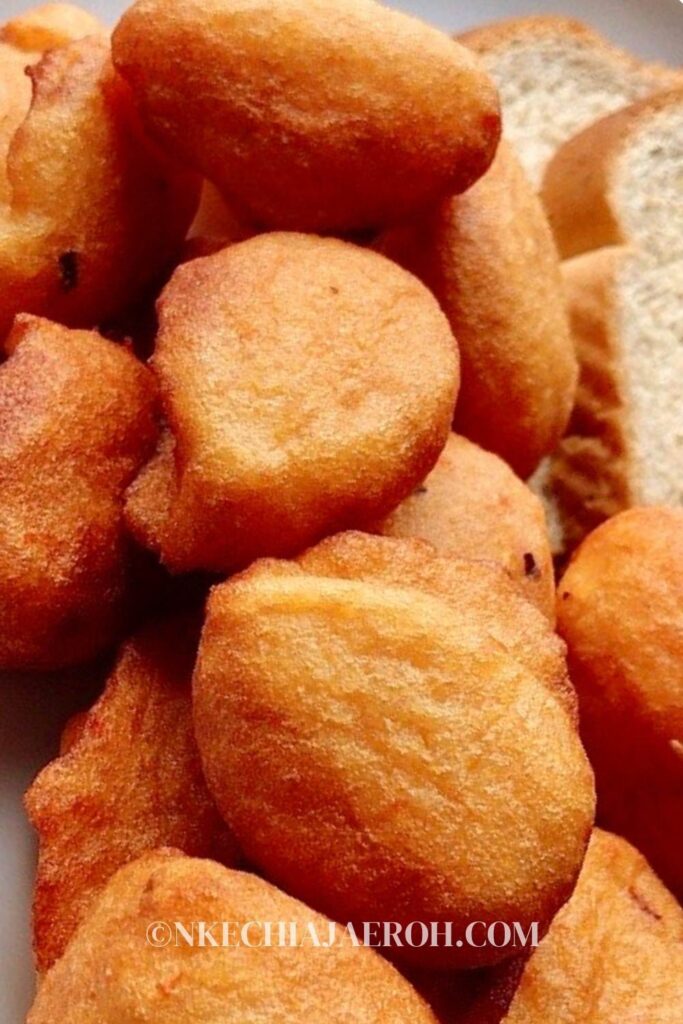
Why You Will Like This Akara Recipe:
- Akara is tasty!
- East to make, and you can easily double batch as well.
- This Nigerian akara recipe is vegan, gluten-free, and low-carb.
- Makes a perfect breakfast, snack, or light dinner
- Akara is a crowd-pleaser, and everyone’s favorite!
- This gives you a taste of Africa.
- It freezes well and lasts up to 90 in the freezer. I suggest making a lot for whenever you want it.
- It pairs well with bread and excellently well with pap or custard (using bird’s custard powder; English custard)
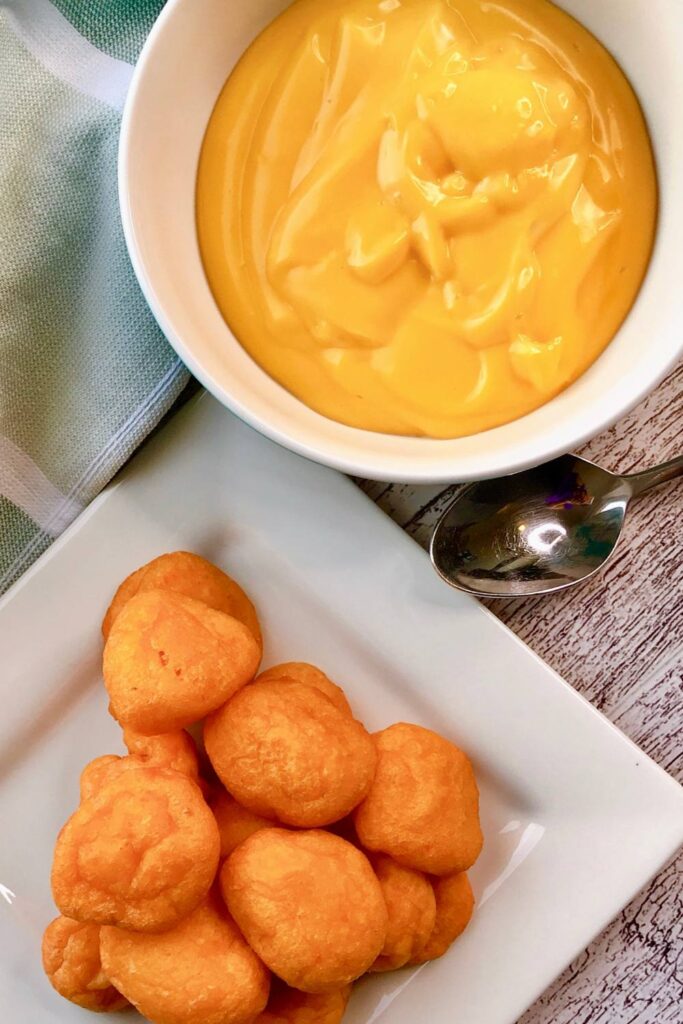
Ingredients for Nigerian Akara
- Black-eyed peas
- Onion
- Fresh bell peppers (Red or orange color preferably. I like using red/reddish bell peppers for this recipe. It gives it gorgeous color)
- Habanero (for that spicy heat)
- Salt and crushed red pepper to taste
- Oil for frying
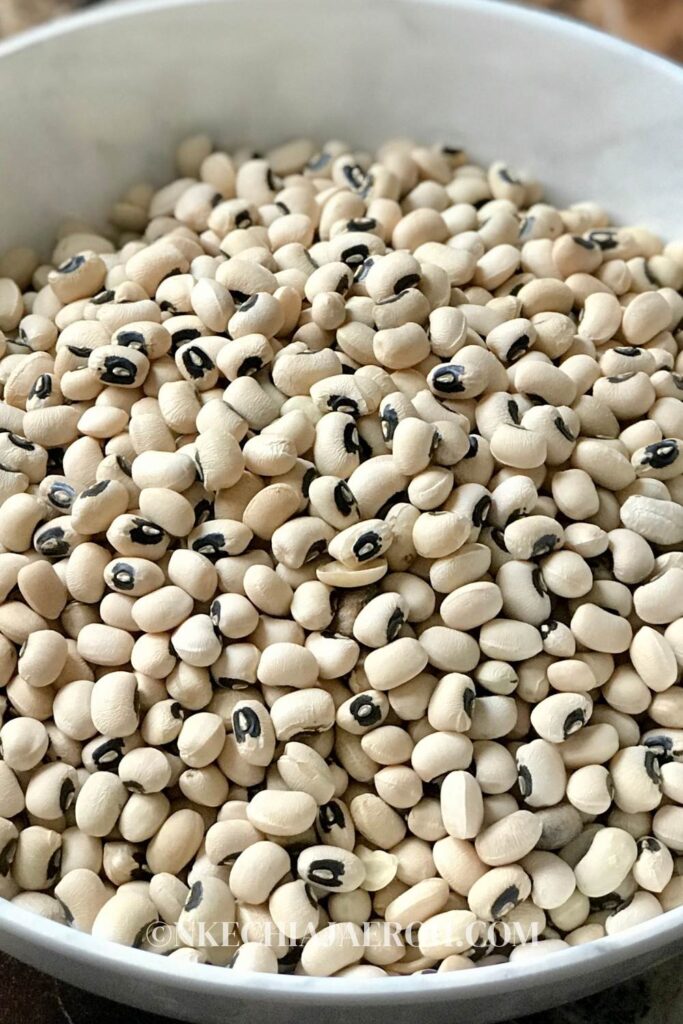
How To Make The Best Nigerian Akara (Step-byStep)
Making Nigerian akara is as simple as 1-2-3 and I am excited in this post!
- Have raw/dry black-eyed peas on hand.
Akara starts with dry beans; have it on hand. These days, I primarily use black-eyed beans; however, Nigerian brown beans are great, too. Simply put, you cannot make authentic akara without raw beans.
- Peel or Deskin beans
Traditionally, you add some water to the beans and continue to rub the wet beans between your palms to remove their skins. As tedious as it sounds, that’s how it’s done. And that’s how my mom taught me how to do it growing up. Currently, I use the blender or food processor to peel/de-skin/wash off bean skins. Follow this recipe to peel/deskin beans using the blender.
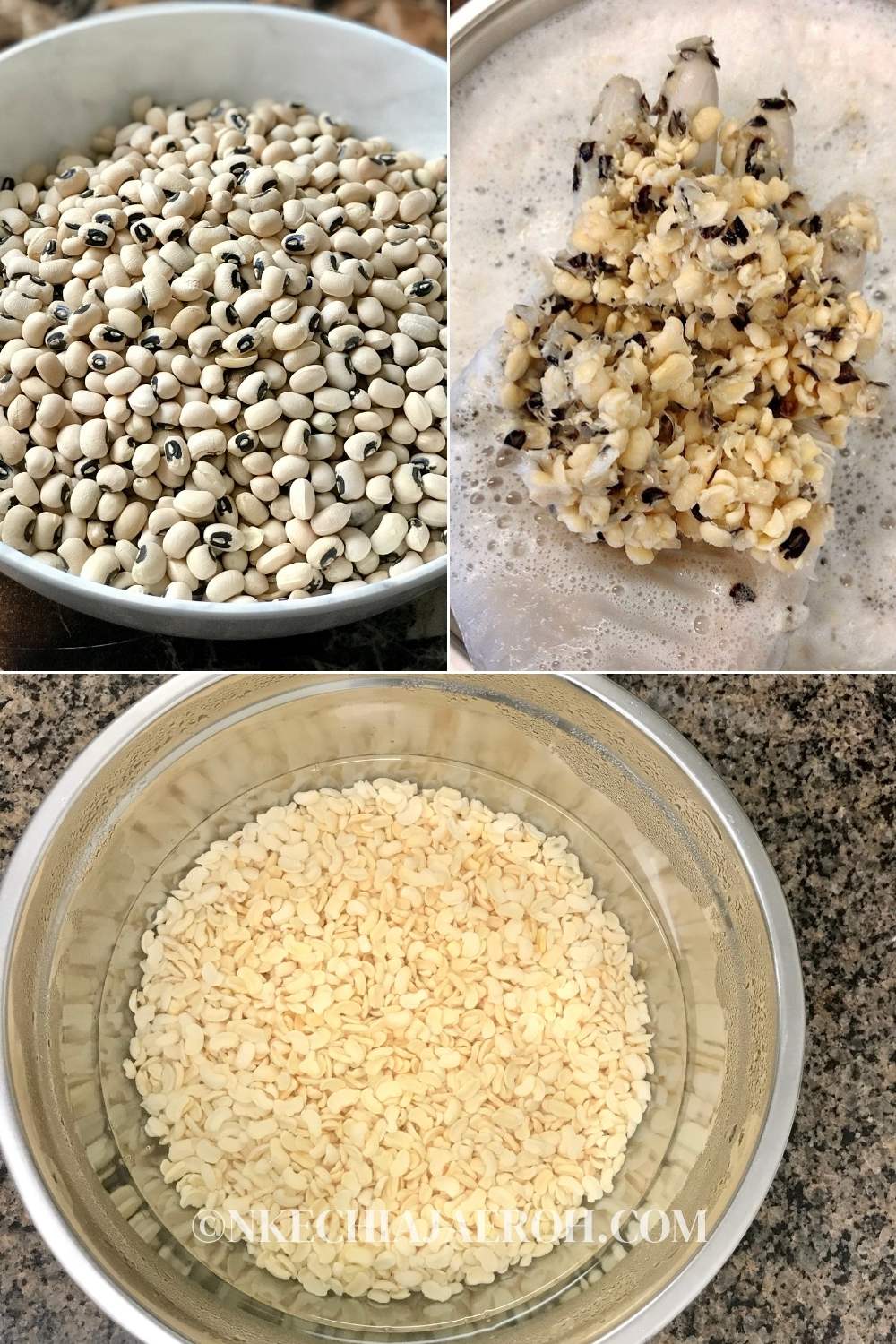
- Blend (Peeled) Beans
Blend the beans with bell peppers, habanero, and onions to look like a paste. Only add a little water when blending. You don’t want a watery or runny paste. The goal is to have a smooth, almost silky consistency and not a runny one. Use a high-speed blender to blend the beans and not a food processor.
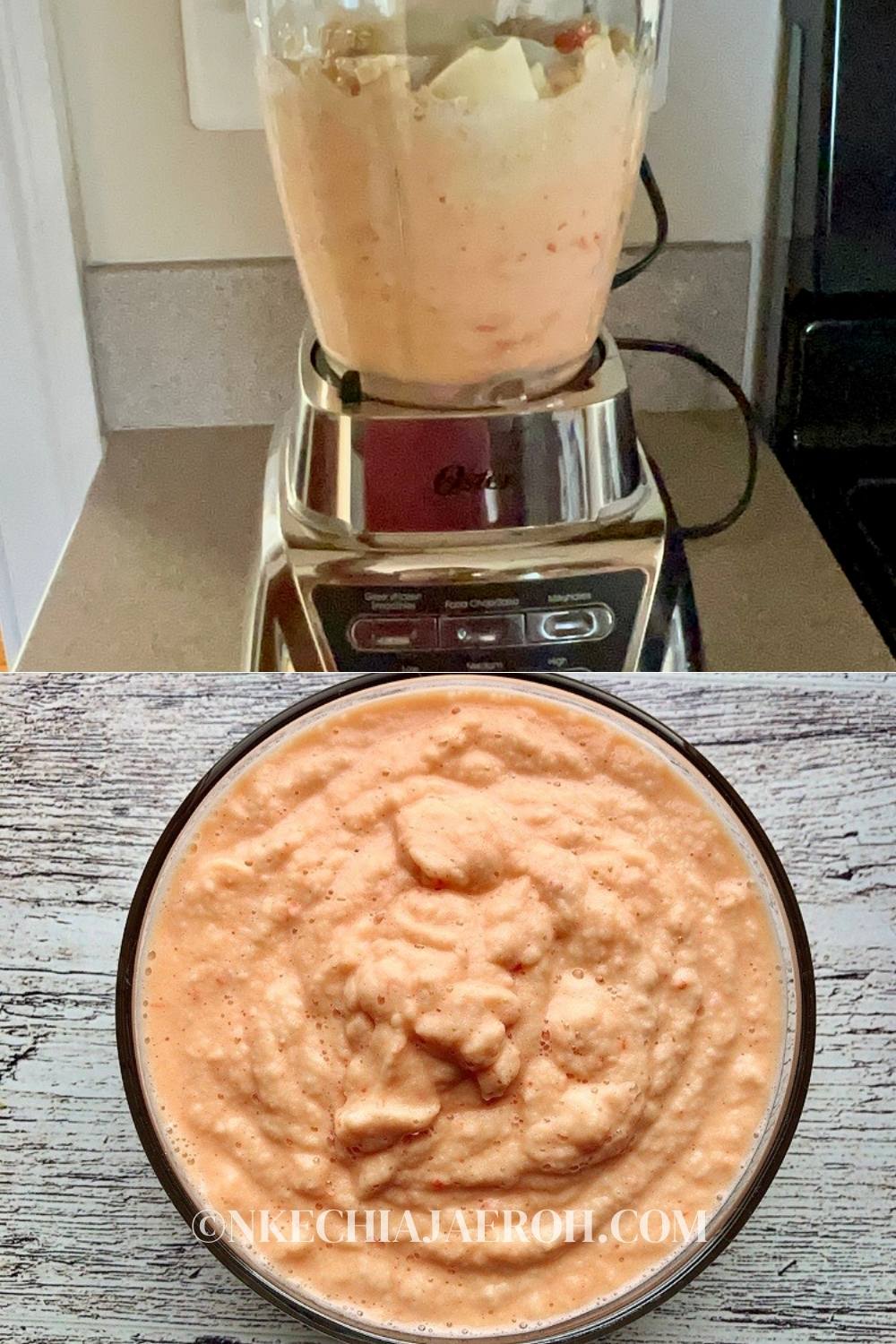
- Season Beans Paste
Season the paste with salt before frying. Typically, I prefer to season the paste as I go. This means I season a bowl of paste before frying it. Here’s how: add about a cup (or more) into a small bowl or mortar, then add a little salt and stir with a pestle or spoon. Taste and adjust as needed, and next is frying time. Remember, a little salt goes a long way. You can also add red flakes.
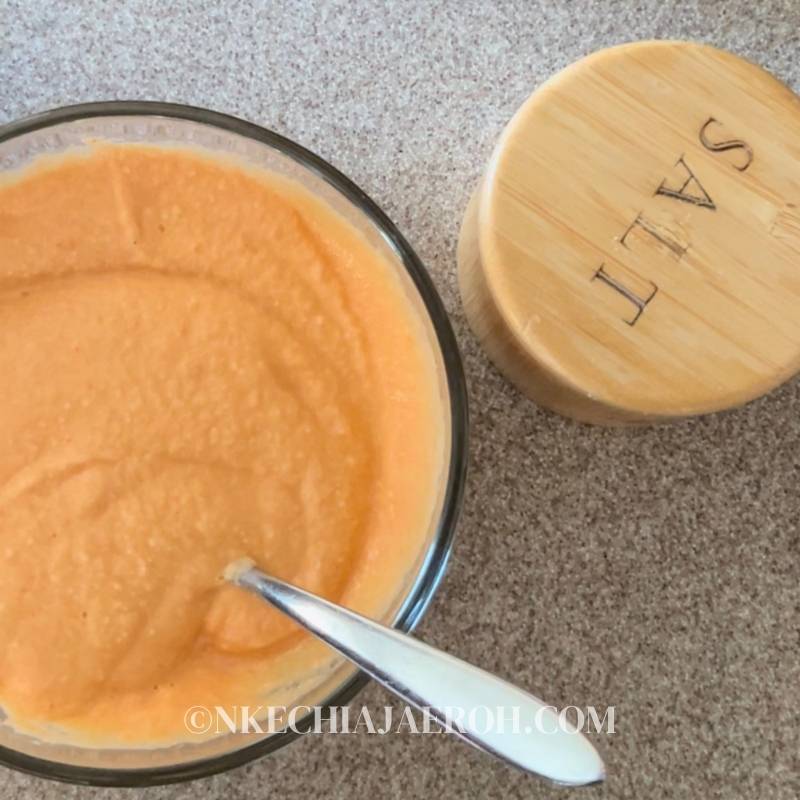
- Fry Akara Balls
To fry akara, first, add enough frying oil up to 3 inches deep. Second, heat the oil. Then, use a tablespoon measuring scoop to add the paste to the hot oil. Third, fry in batches, and do not overcrowd the pot. Finally, place all fried akara on a paper towel-lined plate.
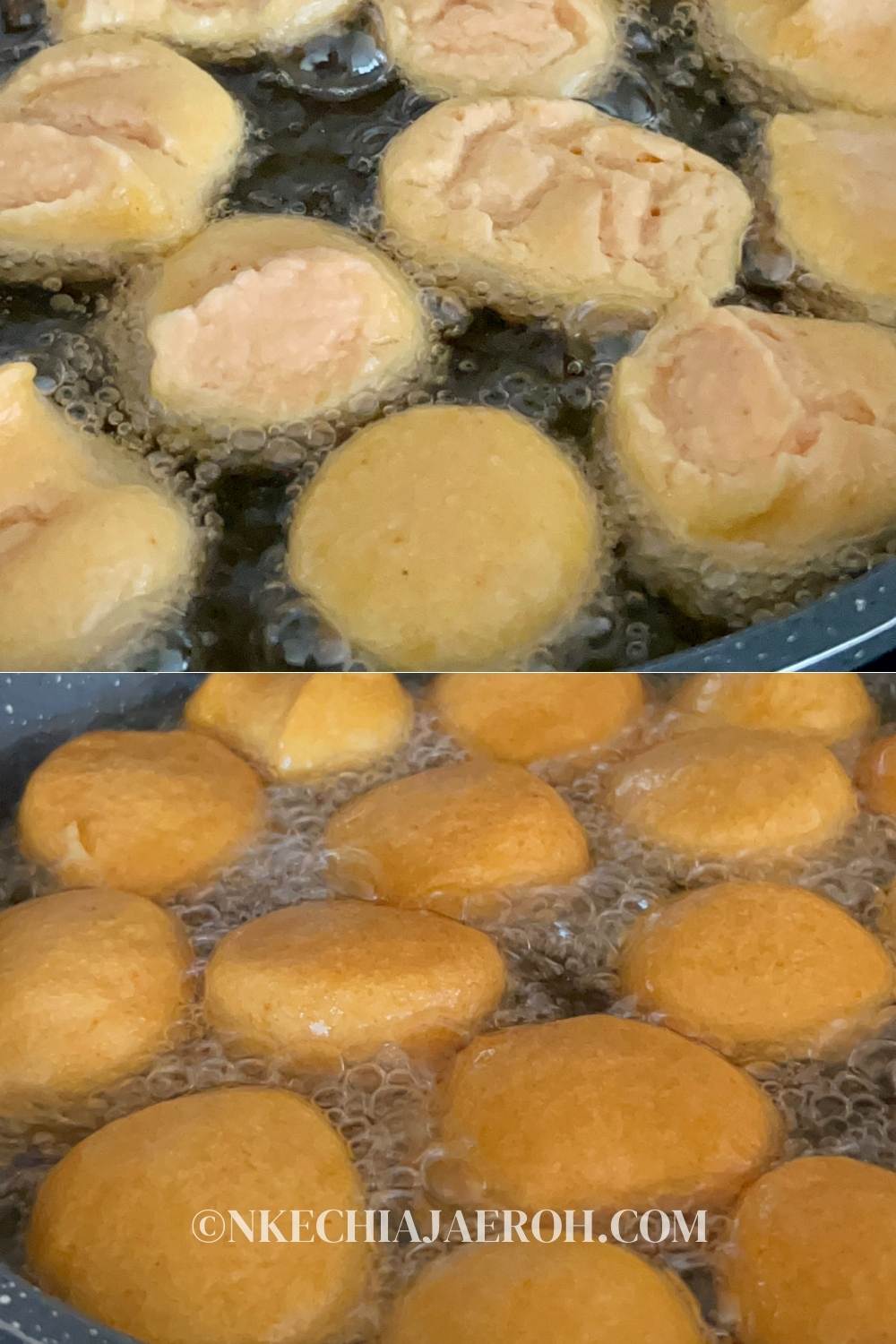
- Serve as You Wish!
Serve and eat akara with bread, custard, or pap. These Nigerian akara balls make a perfect snack! Yummy!!
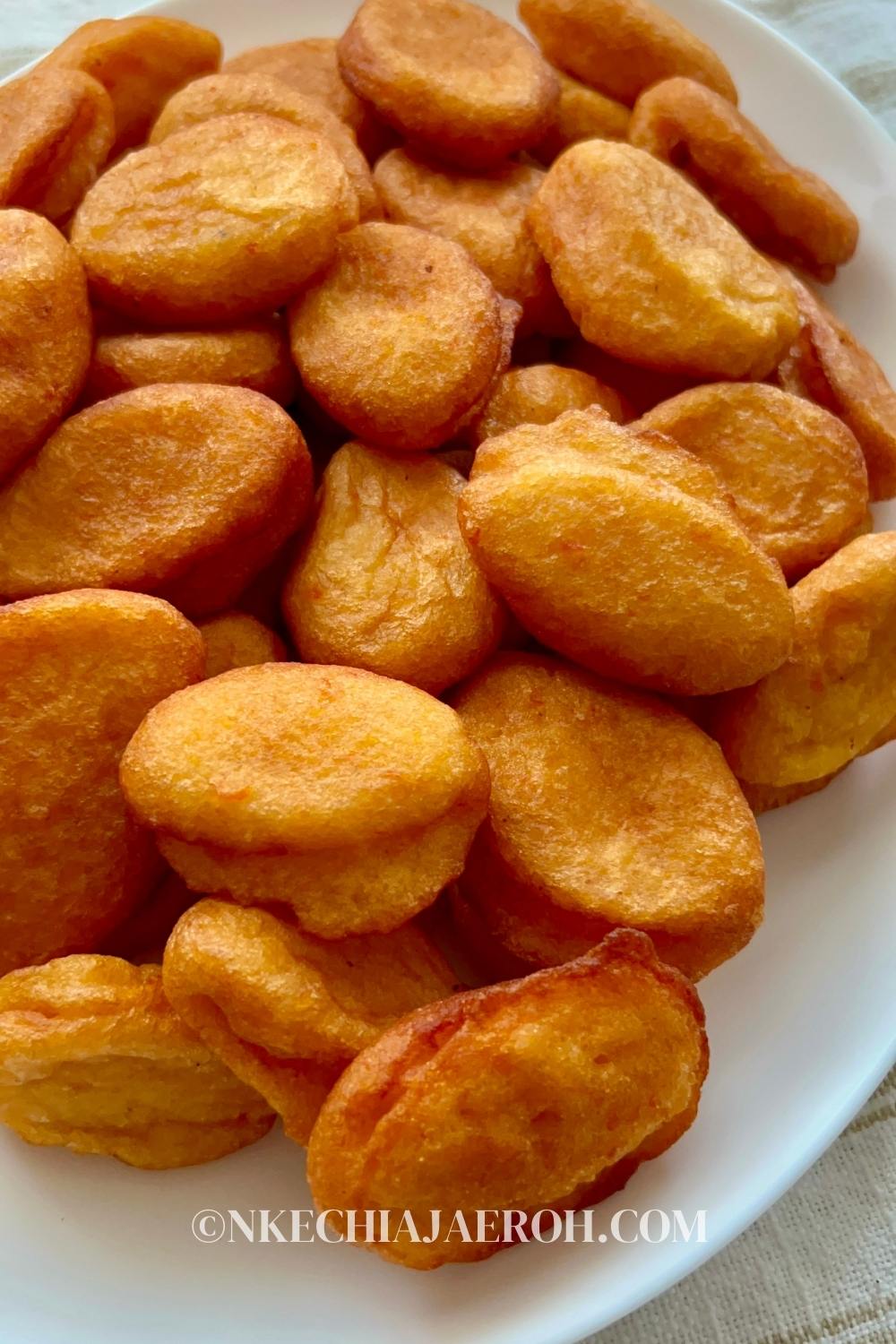
AKARA NOTES/TIPS:
- Only add a little water when blending. This could cause your paste to become watery or runny. Add a tad bit that allows you to blend it. I don’t recommend more than one cup of water for 1 pound of black-eyed peas beans.
- Add a little bit of salt, stir very well, and taste. Only add a little initially, or you could accidentally oversalt your food.
- Use your oil of choice. Most of the time, I use peanut oil for frying. I prefer to use a tablespoon measurement to add my bean paste to the hot oil. However, you can use a bigger scoop. As a family, we like small akara balls.
- When it comes to akara, serve/eat as you wish; some people will eat this by themselves (like my kids all day, every time)! lol
- I have heard about people using “beans flour.” That would be a story for another day! But I do not recommend it.
- Keep your akara recipe simple! No need for curry, thyme, Maggi, or Knorr. Those seasonings will take away from the original authentic African akara.
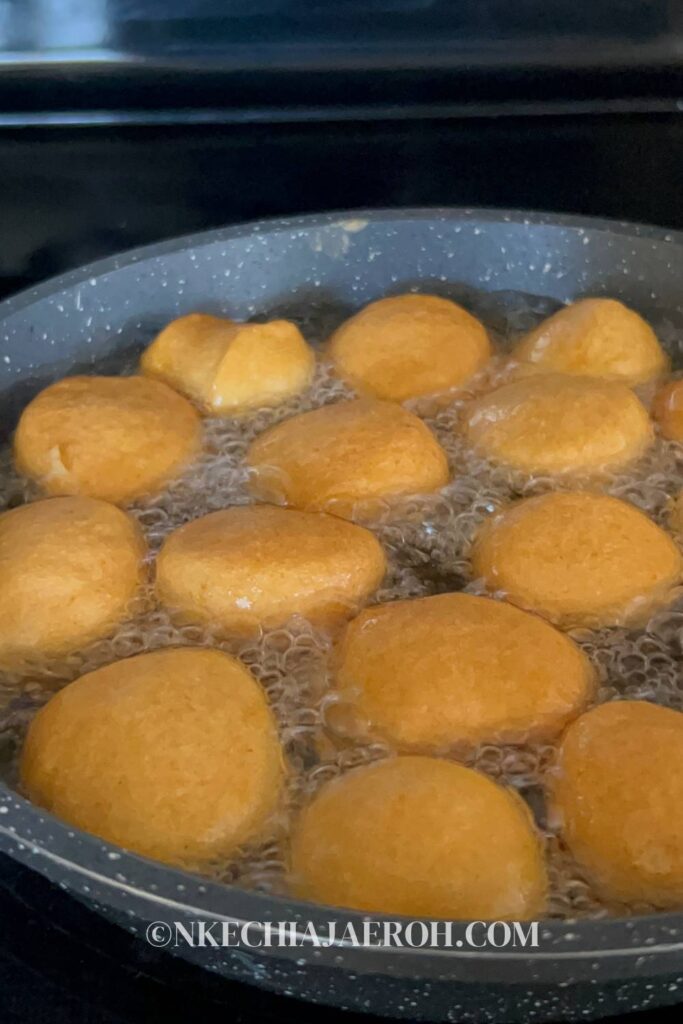
How to Serve Akara:
What is akara eaten with? While you can enjoy akara by itself as is, you can pair it with bread, pap, or custard. You can also dip your akara in pepper sauce! See below how I typically serve our akara balls:
Nigerian Akara with Pap or Custard.
Growing up in Nigeria, we look forward to eating akara daily, either with bread, pap, or custard! This prevalent Nigerian street food is always a choice of breakfast for most families. While some people will eat this by itself, similarly pairing akara with akamu (corn pudding or pap) is always a fantastic choice. Or simply substitute pap/corn pudding with custard, like the photo below. We prefer bird’s custard powder around here. This combo is the G.O.A.T! You are missing a whole deal if you have never tried black-eyed peas, fritters, and custard.

Ever heard of Nigerian Akara burger?
Probably that’s the best way to eat Nigerian Akara, well, according to my husband – YUM! This dish, just like Rice and stew, pepper soup, and okra soup, reminds me so much of childhood. Simply sandwich akara balls in between two slices of bread.
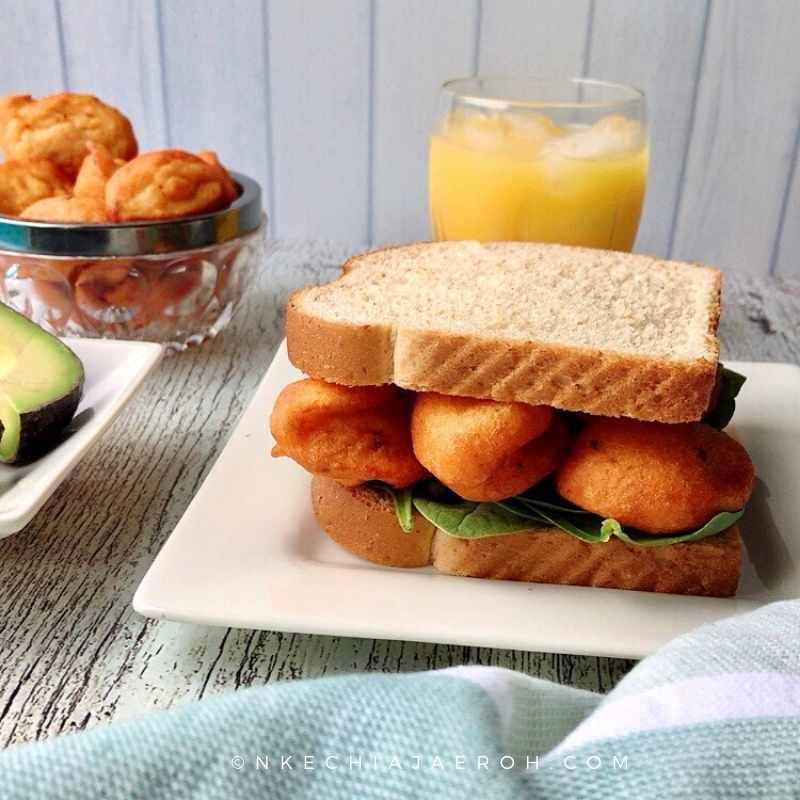
Akara and Bread
One of the best ways to enjoy delicious warm akara is with bread. It never fails, and still, to date, it is one of the typical ways most people in Africa enjoy this delicious. You gotta try akara na bread.
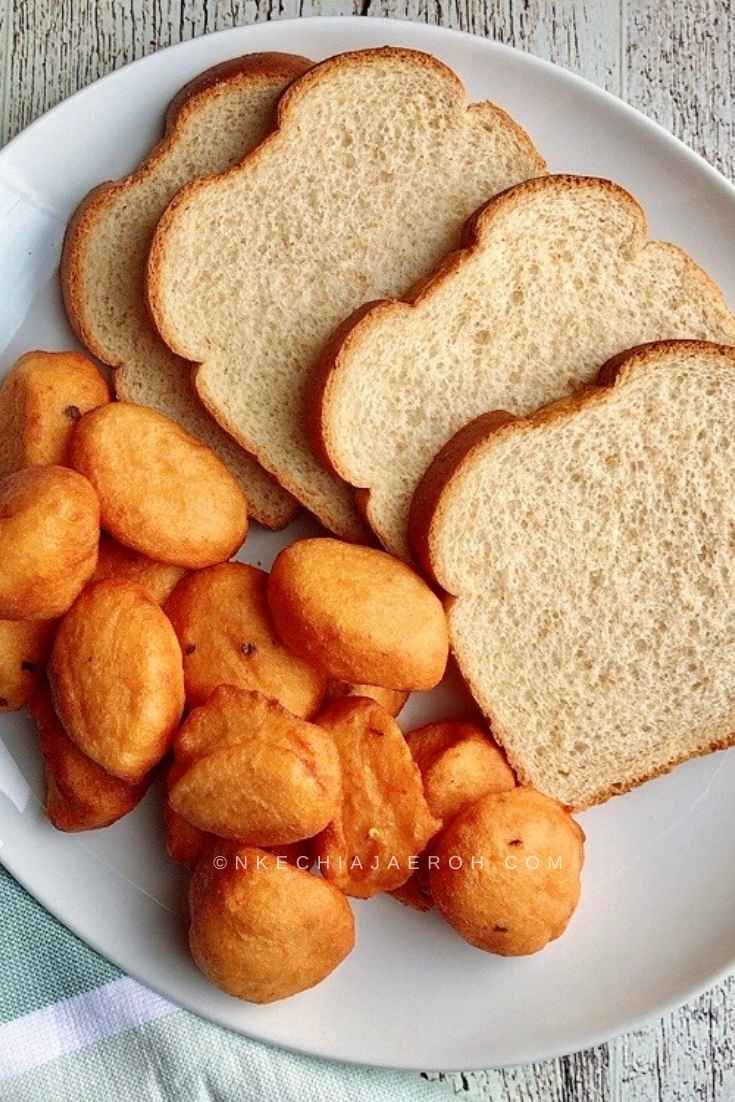
Family Time is Nigerian Akara Time.
Without question, all you need for extraordinary family time is the best Nigerian akara. Kids love it, adults love it, everyone is happy, problem solved! My kids and husband love Akara very much, and this only mean one thing – we make it more often (at least 3x every month!)

Do you put Maggi in akara?
NO. Akara doesn’t require Maggi, Knoor, Cajun, or Creole seasoning. It doesn’t need nutmeg, thyme, or any of those fancy herbs, spices, and Seasoning. Authentic akara is simple. Add bell peppers, onions, habanero, and salt alongside your beans to make the best Nigerian akara.
Why is my akara not floating?
Your akara may not float for different reasons. Add salt shortly to the batter/paste that you will be frying. Salt can disarm the leavening agent in the bean paste and cause your akara balls not to rise/float. Additionally, ensure that you are frying them in a big pan that can accommodate them as they rise. Also, make sure that the batter/bean paste isn’t too runny.

How to make Akara: Nigerian Bean Fritters
If you are ready, let’s make some Akara!
Print
How to Make the Best Nigerian Akara
- Prep Time: 35 minutes
- Cook Time: 25 minutes
- Total Time: 1 hour
- Yield: 10 – 12 1x
- Category: Nigerian Breakfast
- Method: Frying
- Cuisine: West Africa- Nigerian Recipe
- Diet: Vegan
Description
Akara, or beans fritters, is a popular Nigerian savory (vegan) fitter made with beans, mainly black-eyed peas. akara, also known as beans cakes, beans balls, koosé, or acarajé, is a famous street food across Africa and beyond. Across most Nigerian cities, you find akara spots in the mornings and evenings. Akara sellers would typically set up their market and start to make/fry fresh akara balls. Also, akara pairs well with corn pudding, bread, custard, as well as very delicious just by itself.
Ingredients
- Black-eyed peas (1 lb. bag or less/more)
- ½ big onion or 1 medium size Onion
- 1– 2 Fresh big bell peppers (Red or orange color preferably. I like using red/reddish bell peppers for this recipe.)
- 1 habanero (for that spicy kick; add more if you like it more spicy)
- Salt and crushed red pepper to taste
- Oil for frying (I normally use peanut oil, and at least 3 inches deep)
- Red pepper flakes (optional)
Instructions
- STEP 1: Have raw/dry black-eyed peas on hand. Akara starts with dry beans; have it on hand. These days, I primarily use black-eyed beans; however, Nigerian brown beans are great, too. Simply put, you cannot make authentic akara without raw/dry beans. I have heard about people using “beans flour.” That would be a story for another day! But I do not recommend it.
- STEP 2: Peel/Deskin Beans. Traditionally, you add some water to the beans and continue to rub the wet beans between your palms to remove their skins. As tedious as it sounds, that’s how it’s done. And that’s how my mom taught me how to do it growing up. Currently, I use the blender or food processor to peel/de-skin/wash off bean skins. Follow this instruction to easily and quickly peel/deskin beans without tears.
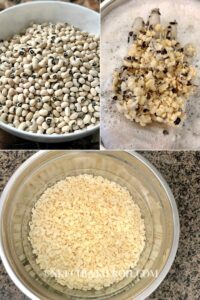
- STEP 3: Blend (Peeled) Beans. Wash/cut onions, bell peppers, habanero, and set aside. Add some of those peeled beans, sliced onions, bell pepper, and habanero to the blender. Add a little water and blend for a paste-like consistency. Only add a little water when blending, as you don’t want a watery or runny batter. I don’t recommend more than one cup of water for 1 pound of black-eyed peas beans. Then, blend for a smooth, almost silky consistency. Pour the mixture into a bowl. Repeat the process to blend all the beans. Note: use a high-speed blender and not a food processor to blend the beans.
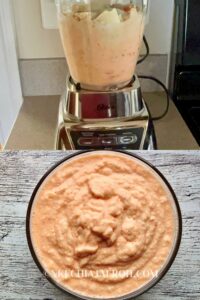
- STEP 4: Season Beans Paste. Season the paste with salt shortly before frying. Typically, I prefer to season the paste as I go. This means I season a bowl of paste before frying it. Here’s how: add about a cup (or more) into a small bowl or mortar, then add a little salt and stir with a pestle or spoon. (Important Note: if you have a mortar and pestle, use them. The pestle serves a great purpose. “Grinding” the paste in a circular motion with the pestle helps to eliminate air from the paste and further “prepares” it for frying. And if you do not have a mortar and pestle, use a bowl, as explained above. Taste and adjust as needed, and next is frying time. Remember, a little salt goes a long way; add in small increments. You can also add red pepper flakes.
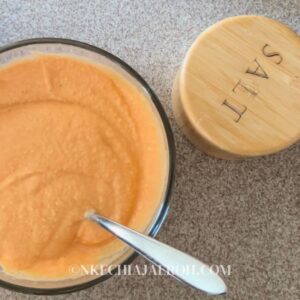
- STEP 5: Fry Akara Balls. The best part of the work begins with frying. To fry akara, first, add enough frying oil up to 3 inches deep. Second, heat the oil, preferably on medium heat. Allow the oil to heat up, but make sure the oil is not too hot. Then, use a tablespoon measuring spoon to add the paste to the hot oil. Note: do not overcrowd the pot. Third, when the underside turns brown, use a fork or wooden skewer to flip the balls so the other side cooks as well. When both sides of the akara balls are cooked, use a strainer skimmer ladle to scoop them off the oil and place them on a paper towel-lined plate. Fourth, fry in batches. Finally, repeat this step to fry all the paste/batter.
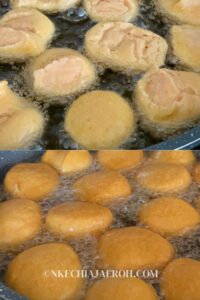
- STEP 6: Serve and Enjoy as You Wish! Serve and eat akara with bread, custard, or pap. These Nigerian akara balls make a perfect weekend breakfast and snacks! Yummy!!
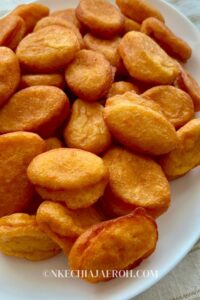 WATCH THE RECIPE VIDEO TUTORIAL ⬇️
WATCH THE RECIPE VIDEO TUTORIAL ⬇️
Notes
Usually, the exact quantity of the ingredients will depend on the amount of akara you want to make. If you are new to akara, you start with 1 – 2 cups of dry beans. Adjust as you wish. Look at my beans paste, and possibly model yours that way.
Add onions, fresh bell peppers, habanero according to your taste. Typically Nigerian AKara doesn’t need other spices such as Maggi, curry, thyme, nutmeg, etc. That’s why those spices aren’t included in this recipe. Akara is super simple and naturally tastes better that way. However, you do you when you are in the kitchen!
Do not use too much water to blend your Akara beans. Usually, Akara paste is thicker than moi-moi paste.
Do not overcrowd the pot while frying the fritters
Avoid overheating the oil; if it is too hot, the outside of the fritters might cook while the inside is still raw.
While frying the Akara, be mindful not fill up the pot with too many Akara balls.
Depending on the size of your pot, add Akara paste to cover only half of the pot because the Akara will rise and likely double in size. They need space to cook properly.
Please do not add (too much) salt to Akara paste as you would do in regular meals. Akara requires a minimal amount of salt because it goes a long way, if not, your Akara will be too salty and almost un-edible. The trick is to add a little increment of salt and taste for flavor. Then you can add (small) salt according to your liking (or health need); you can also add more peppers, and then fry.
Usually, the serving size of Akara will depend on how big or small the balls are; I make mine small just like photos on this post and I eat plenty.🤣😊🤷🏾♀️
MORE NINGERIAN BREAKFASTS TO TRY:
Nigerian Fried Yams and Plantains
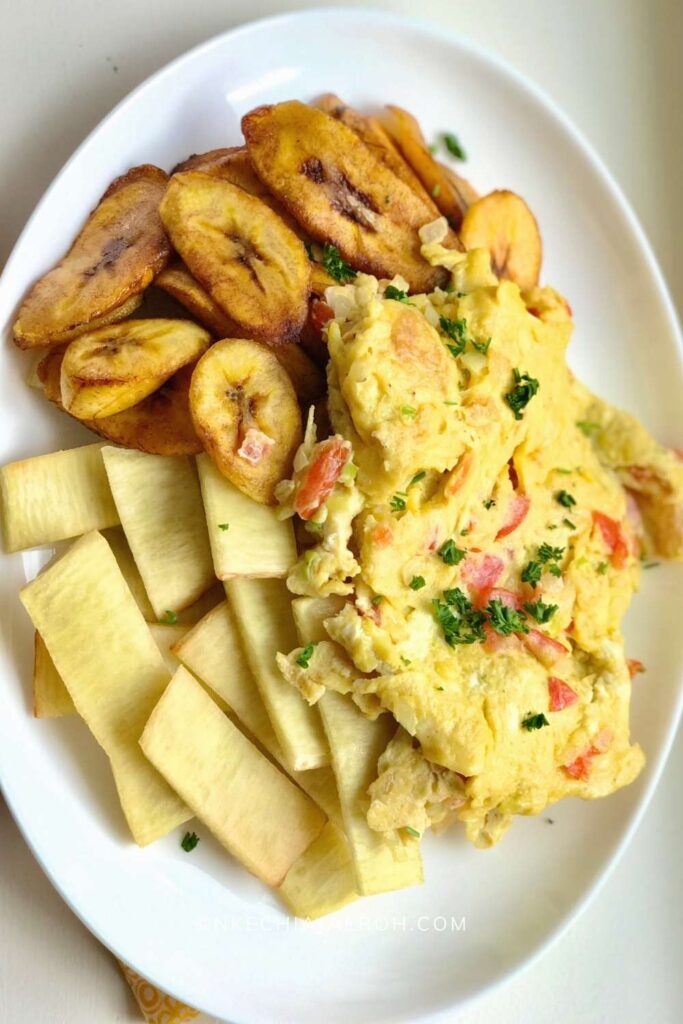
Nigerian Sandwich Toast Recipe
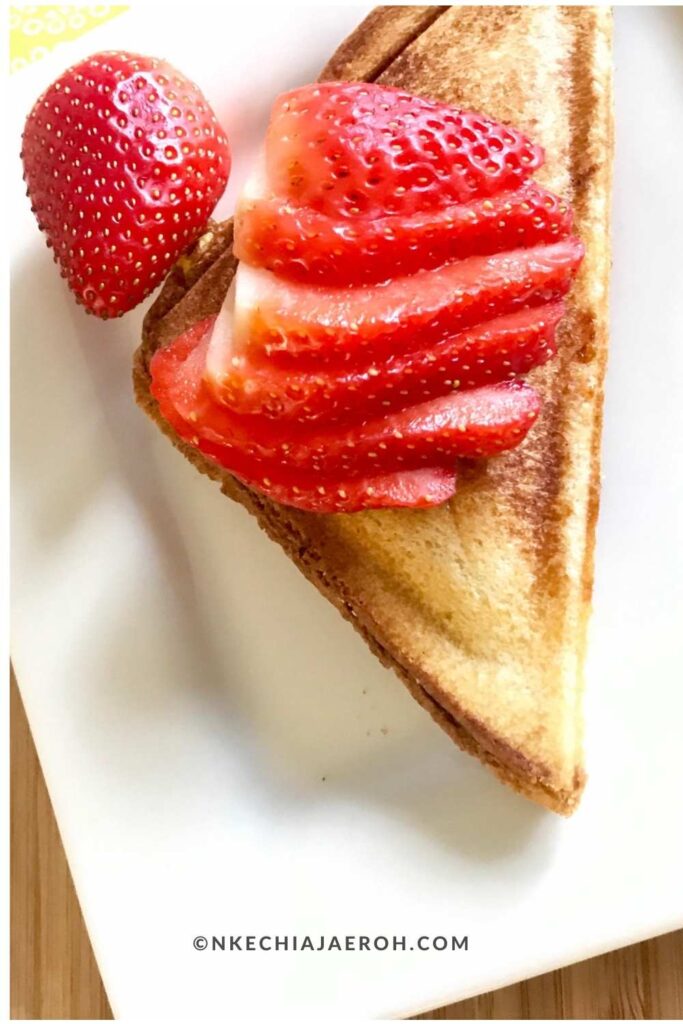
Boli – Nigerian Baked Ripe Plantains Recipe
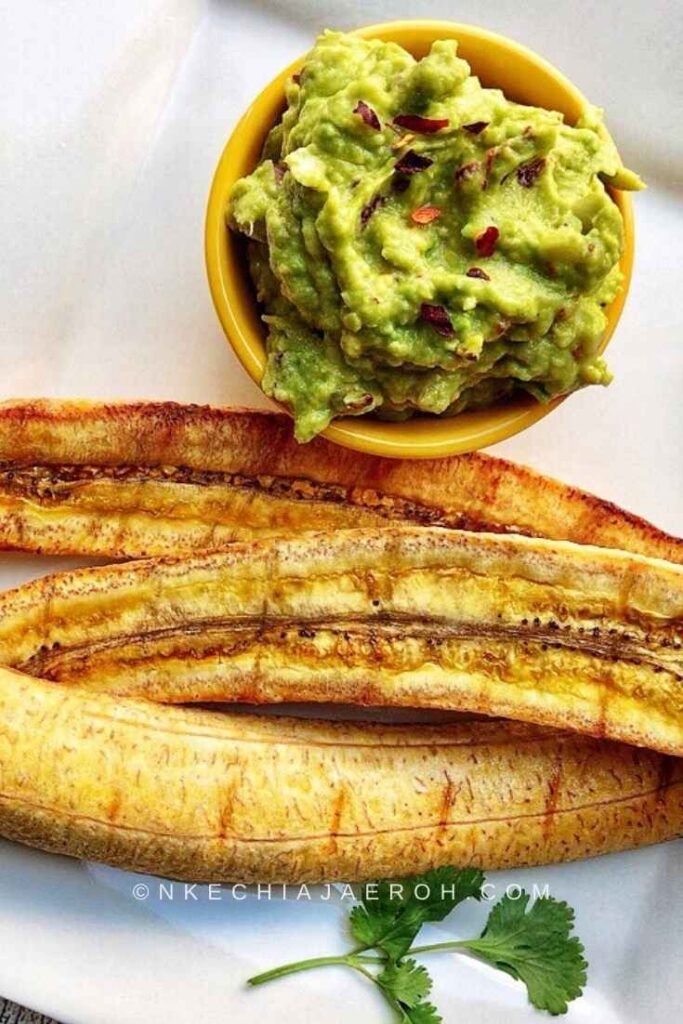
Baked Plantains and Eggs Frittata
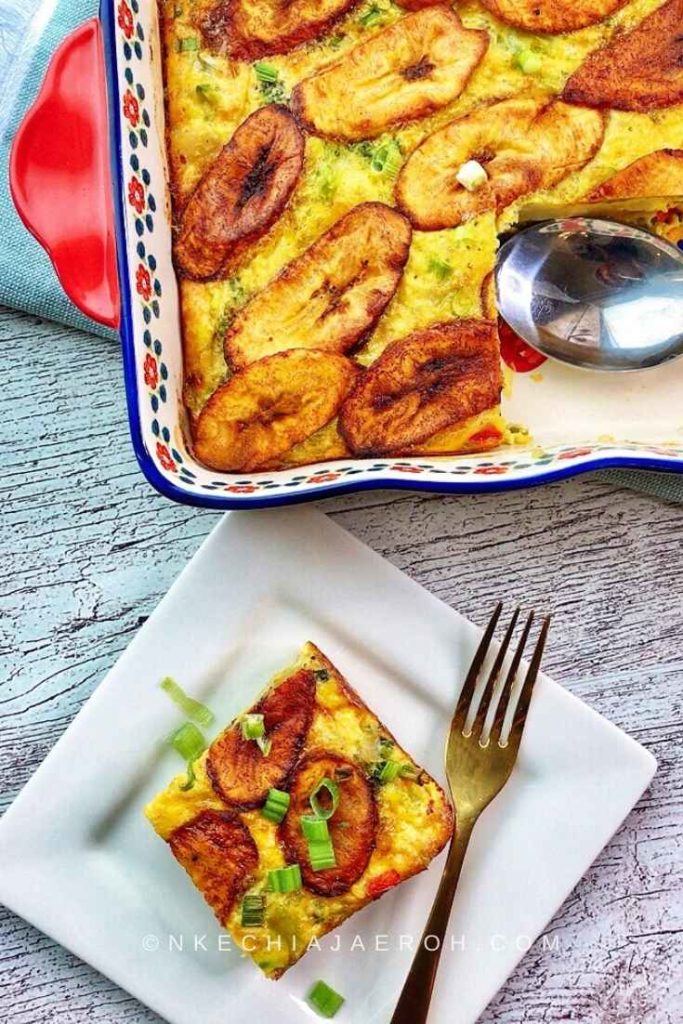
Other Nigerian Beans Recipes:
- The Best Nigerian Moi-moi Recipe.
- How to Easily Peel/deskin beans for Akara or moi-moi,
- The Best Nigerian Beans Porridge (Stewed Black-eyed Peas)
- Check out all my Nigerian Recipes!
Finally, let’s connect on social media, am on Pinterest, Facebook, Instagram, Twitter, and YouTube. If you like video recipes, then be sure to head over to my YouTube Channel. Share this post, and SAVE/PIN THIS IMAGE ON PINTEREST! ⤵️
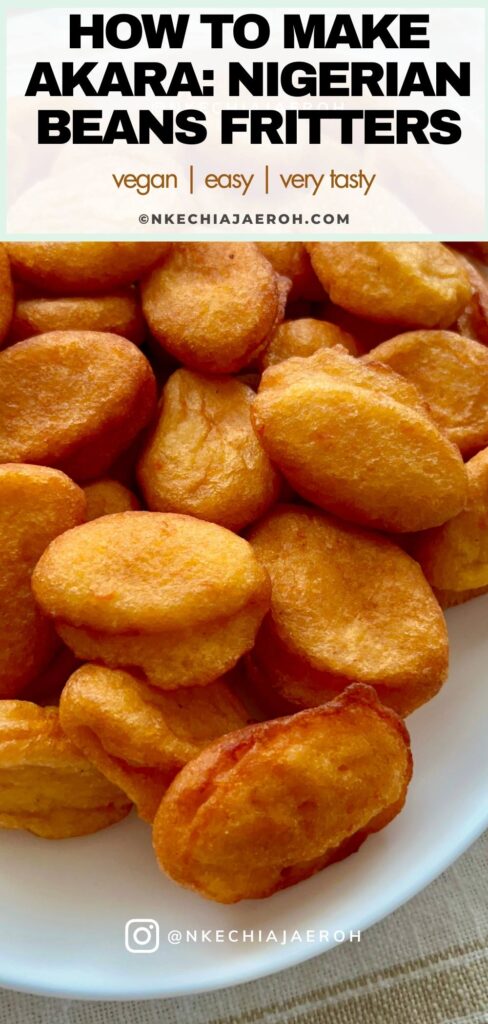
THANKS FOR STOPPING BY! Stay well, safe and keep living your life to the fullest!



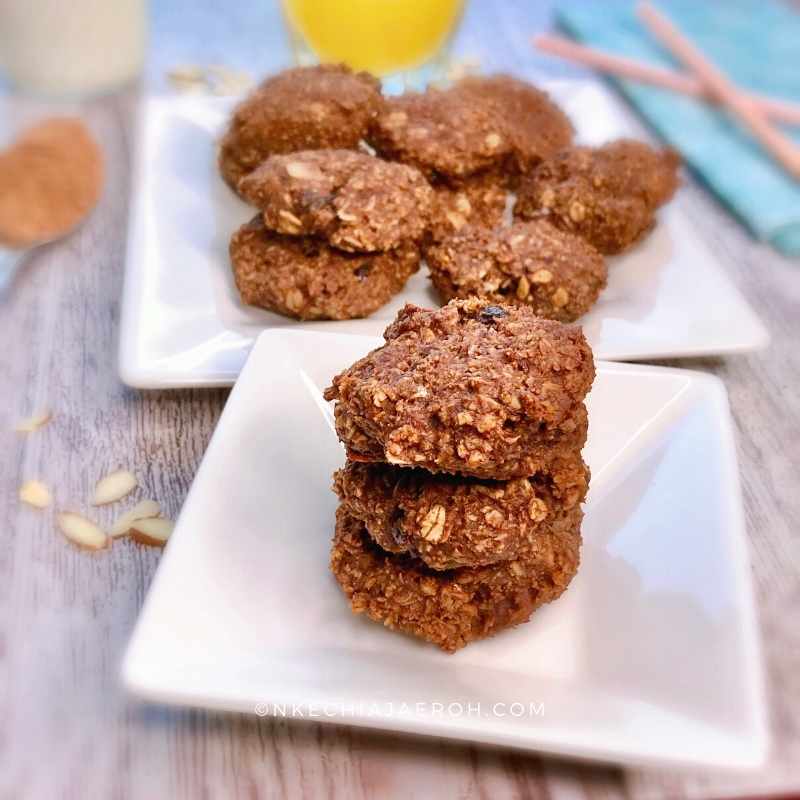

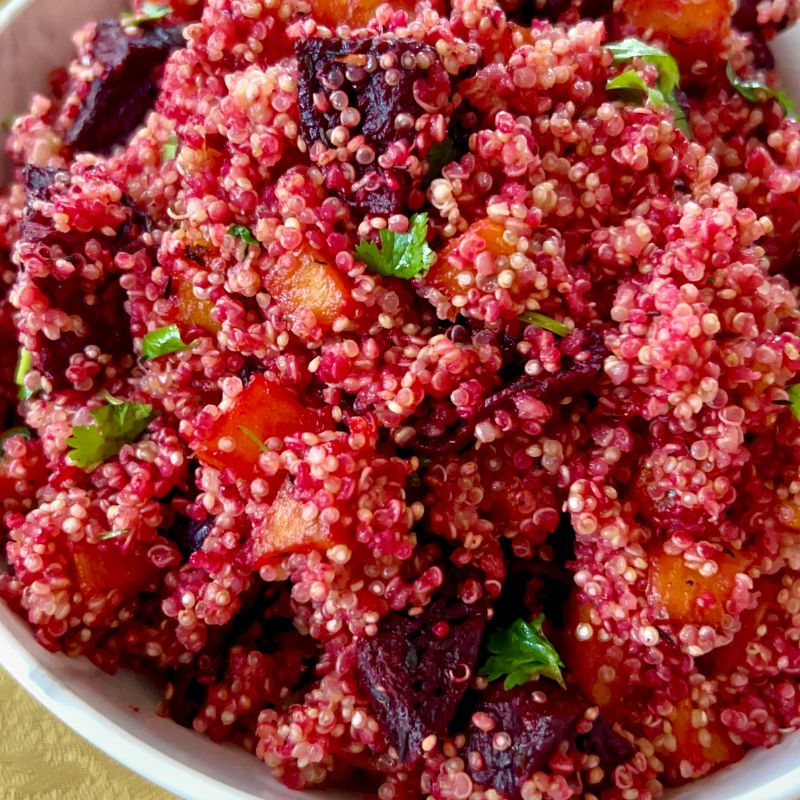
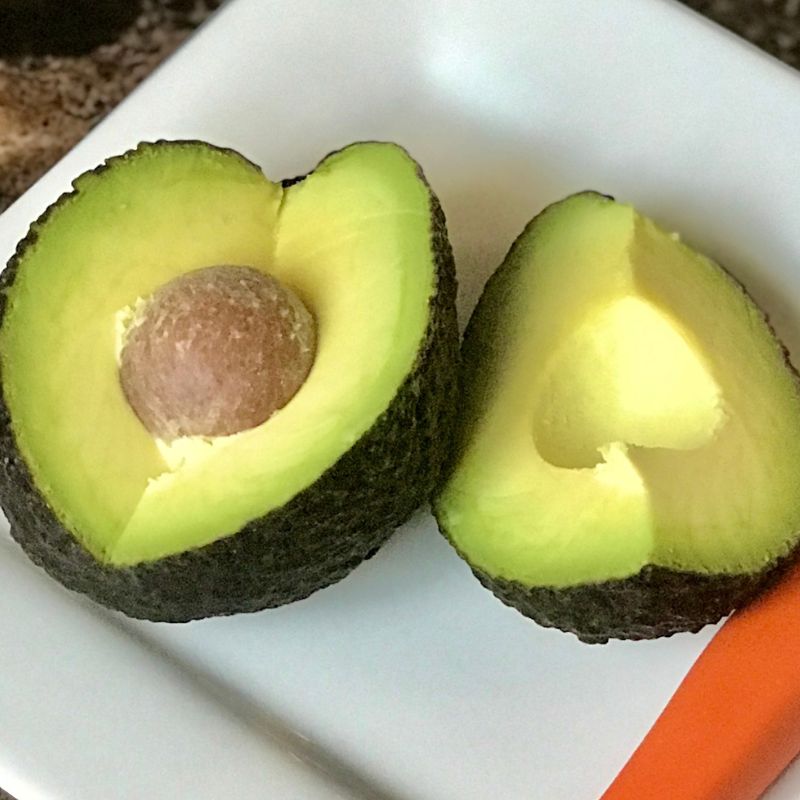
Too nice
I enjoy trying new recipes and glad I tried this one. I had not heard of akara before. The dish is so delicious and easy to make by following your instructions. Glad it’s vegan as I have several vegan family members.
Thanks so much for your feedback, Stephanie! Glad you liked this recipe!
I had never heard of this before, but wanted to try it as soon as I saw it. The flavours in this were amazing and I will definitely be making it again.
Woohoo, Dannii!!! Glad you to hear this! Thanks for trying this recipe.
I tried these for these for the first time and they were amazing! I kept it simple and just had it by itself – so delicious. Thank you!
Nice to hear that you had it by itself! That’s the way my kids like it too. Thank you, Bobby!
Love trying new things and this one is next. Thanks!
Wonderful and I hope you enjoy!☺️
Wow, I love learning about new foods and this recipe is so cool. Thank you for sharing, you broke down everything about akara in such an easy to understand way!
Awww, am happy to hear that you enjoyed learning about akara, Ashley! Glad this is an informative post.